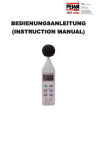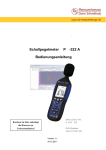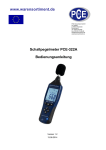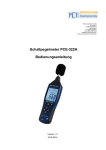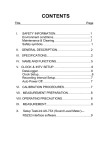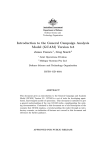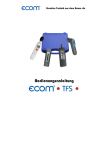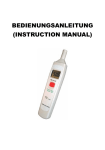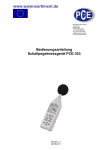Download TFA 31.2000
Transcript
BEDIENUNGSANLEITUNG (INSTRUCTION MANUAL) DATA LOGGER SOUND LEVEL METER INHALTSVERZEICHNIS Titel Seite I. SICHERHEITSINFORMATIONEN Sicherheitssymbole 2 2 II. ALLGEMEINE BESCHREIBUNG 2 III. SPEZIFIKATION 3 IV. FUNKTIONEN 4 V. UHR UND EINSTELLUNGEN 7 VI. KALIBRIERUNG 8 VII. GERÄTEVORBEREITUNG 9 VIII. MESSVORBEREITUNGEN 9 IX. MESSUNG 10 X. Softwareeinstellung TestLink SE-322 10 XI. Verwendung der Mikrofonverlängerung 15 1 DATA LOGGER SOUND LEVEL METER I. SICHERHEITSINFORMATIONEN Lesen Sie bitte sorgsam die folgenden Informationen, bevor Sie mit den Messungen beginnen. Benutzen Sie das Messgerät nur in der beschriebenen Form, anderenfalls erlischt die auf das Gerät gewährleistete Garantie. Umweltbedingungen § Relative Feuchtigkeit max. = 90% rH § Arbeitstemperaturbereich = 0…+ 40 °C. Wartung & Reinigung § Reparaturarbeiten am Gerät sollten nur durch den Hersteller durchgeführt werden. § Halten Sie bitte as Gerät sauber und in trockenem Zustand. Das Gerät unterliegt den allgemein gültigen Normen und Standards (IEC651 Typ2, ANSI S1.4 Typ2) und ist CE-zertifiziert. II. ALLGEMEINE BESCHREIBUNG Das Datenspeicher-Schallpegelmeter SL 322 verfügt über einen internen Datenspeicher für 32000 Werte. Immer, wenn Sie den “REC”-Knopf drücken und nach der Messung wieder den “REC”-Knopf, dann wird ein Datensatz in den Speicher geschrieben. Mittels der RS232 – Schnittstelle können die Messwerte zum PC Übertragen werden. 2 DATA LOGGER SOUND LEVEL METER III. SPEZIFIKATION Standards: IEC651 Type2, ANSI S1.4 Type2 Frequenzbereich : 31.5Hz ~ 8KHz Messbereich : 30 ~ 130dB Wichtung/Bewertung : A / C Mikrophon: 1/2 inch Electret Kondensor Mikrophon Display1 : LCD, 4-stellig Auflösung: 0.1dB Werteerneuerung: 0.5 s Display2 : 50 Segment Bargraph Resolution: 1dB Werteerneuerung: alle 50 ms Zeitliche Bewertung: FAST ( 125 ms ), SLOW ( 1 sec. ) Messbereiche: Lo: 30 – 80 dB Med: 50 – 100 dB Hi: 80 – 130 dB Auto: 30 – 130 dB Genauigkeit: ±1.5dB ( unter Referenzbedingungen @ 94 dB, 1KHz ) Alarmfunktionen: “OVER” wird angezeigt, wenn der aktuelle Messwert höher als der gewählte Messbereich ist “UNDER” wird angezeigt, wenn der aktuelle Messwert niedriger als der gewählte Messbereich ist MAX/MIN-Wert: Hold-Funktion für den Kleinst- u. Höchstwert AC-Ausgang: 1 Vrms / bezogen auf den Maximalwert des gewählten Messbereiches) Ausgangsimpedanz : ungefähr 100Ω DC-Ausgang: 10mV / dB Stromversorgung : 9V-Batterie (typisch für 50 Betriebsstunden) AC-Adapter: 9 VDC ( 8-15VDC Max, Netzadapter) Anliegende Versorgung: > 30mADC Stecker: pin → Masse Arbeitstemperatur: 0 ...+40 °C ( 32 ... +104 °C ) 3 DATA LOGGER SOUND LEVEL METER Arbeitsfeuchte: Lagertemperatur: Lagerfeuchte: Dimensionen: Gewicht: Accessories: 10 bis 90% rH -10 ... 60 °C ( 14 ... 140 °C ) 10 bis 75%rH 275 (L) × 64 (W) × 30 (H)mm 285g (inkl. Batterie) 9V Batterie, Tragetasche, Schraubendreher, Bedienungsanweisung. Windschutz, 3.5V-Stecker, Software, RS-232 IV. NAME AND FUNCTIONS 9 • 1 2 3 6 A C SETUP 4 7 FAST SLOW CLOCK INTV REC LEVEL 9V BATTERY NEDA 1604 6F22 006P CAL MAX MIN PLEASE READ MANUAL FOR SAFETY OUTPUT RS-232 8 Lo = 30 Med= 50 Hi = 80 Auto= 30 DC 9V 5 80 dB 100 dB 130 dB 130 dB OPEN POWER-UP OPTIONS 4 DATA LOGGER SOUND LEVEL METER (1) Windschutz Wenn Sie bei Windgeschwindigkeit > 10m/s messen, verwenden Sie bitte den Windschutz auf dem Mikrofon (2) Display Symbol MAX MIN FAST SLOW dBA dBC Funktion Maximalanzeige Minimalanzeige Überbereichsanzeige Unterbereichsanzeige Schnelle Antwort Langsame Antwort A-Bewertung C-Bewertung Bereichswahl Batterie “schwach” Unterbereich 20dB (3) Betrieb Der (1) schaltet das Gerät und die Hintergrundbeleuchtung an und aus. Drücken Sie die Taste einmal, um das Gerät ein- o. auszuschaltenhalten Sie die Taste einen Moment gedrückt, um Hintergrundbeleuchtung ein oder auszuschalten. Halten Sie die Taste ca. 3s lang gedrückt, um das Gerät abzuschalten. Anmerkung: Beim Einschalten wird der zur Verfügung stehende Speicherplatz angezeigt. 5 DATA LOGGER SOUND LEVEL METER (4) MAX / MIN Halte-Taste Durch Drücken dieser Taste wird nur der Max-Wert angezeigt. Der aktuelle Wert ist nur noch durch die Bargraph-Anzeige zu sehen. Durch weiteres Drücken der Max/Min-Taste wird nur der Min-Wert angezeigt. Um diesen Modus zu deaktivieren, halten Sie die Taste 2s lang fest. (5) Datalogger-Taste Wenn Sie diese Taste einmal drücken, beginnt das Gerät mit der Aufzeichnung. Ein weiteres Drücken stoppt die Datenaufzeichnung. (6) Frequenz-Bewertungs-Taste A: A-Bewertung für allgemeine Messungen C: C-Bewertung zur Messung im niederfrequenten Bereich (7) Taste für zeitliche Bewertung FAST, (schnell): für normale Messungen und zur Erfassung von Schallspitzen SLOW, (langsam): für die Messung des Durchschnitts-Pegels bei stark wechselnden Messwerten (8) Bereichs-Kontroll-Taste Immer, wenn Sie dies Taste drücken, wechselt der Messbereich zwischen “Lo”, “Med”, “Hi” und “Auto” Level. (9) Mikrofon 1/2 inch Electret Kondensor Mikrofon (10) CAL-Potentiometer Wird zur Kalibrierung des Gerätes benutzt (Abschnitt Kalibrierung). (11) RS-232 Schnittstelle: RS-232 – Signalausgang: 9600 Baud N, 8, 1, seriell. 6 DATA LOGGER SOUND LEVEL METER (12) Signalausgabe AC: 1 Vrms, jeweils anliegend beim Maxwert eines jeden Messbereiches (verwendet wird zur Übertragung ein Standard-Koaxialkabel 3,5 mm) Bemerkung: Im “Auto” Level-Bereich müssen Sie “Lo” oder “Med” oder “Hi” – Bereichswahl vorgeben. DC: 10mV/dB Ausgangsimpedanz 1 KΩ (verwendet wird zur Übertragung ein Standard-Koaxialkabel 3,5 mm) (13) Externer DC 9V-Eingang für Adapter-Spannungsversorgung (14) Gewindebohrung zur Montage eines Stativs (15) Batteriefachdeckel V. UHR UND EINSTELLUNGEN § DataLogger: 1. Wenn Sie die “REC”-Taste einmal drücken, beginnt die Aufzeichnung. Wenn Sie die Taste wieder drücken, wird die Aufzeichnung gestoppt. 2. Wenn Sie die gespeicherten Daten löschen möchten, schalten Sie das Gerät aus, drücken und halten Sie den “REC”-Schalter zusammen mit dem Ein-Schalter für 5 Sekunden. Dann erscheint “CLR” und “SURE” auf dem Display. § Clock Setup : 1: Drücken u. halten sie die “A/C” – Taste und schalten Sie das Gerät ein. 2: Drücken Sie die “MAX MIN”(clock)-Taste: 3: Drücken Sie die "REC" ▲-Taste oder die "LEVEL" ▼ – Taste, um den nächsten Menüpunkt auszuwählen. Die Auswahlreihenfolge ist “year : 7 DATA LOGGER SOUND LEVEL METER month : day : hour : minute” (Jahr, Monat, Tag, Minute). Dann drücken Sie die “MAX MIN”(clock) – Taste noch einmal, um den Vorganz zu beenden. Aufnahmeeinstellungen: 1: Drücken u. halten Sie die “A/C” – Taste und schalten das Gerät ein: 2: Wählen Sie “FAST/SLOW"(INTV): 3: Drücken Sie "REC" ▲ oder "LEVEL" ▼ um die jeweilige Einstellung vorzunehmen. Ebenso für “FAST/SLOW " (INTV) und noch einmal “FAST/SLOW” (INTV), um die Einstellungen zu beenden. Wenn Sie den Vorgang abbrechen möchten, schalten Sie das Gerät einfach ab. Auto Power Off: Standardmäßig schaltet sich das Gerät nach30 min ab. Diese Funktion lässt sich abschalten. Drücken und Halten Sie die “FAST/SLOW” – Taste, schalten Sie das Gerät ein und die autom. Abschaltung ist ausgeschaltet. VI. KALIBRIERUNG § Unter Verwendung eines additionalem Kalibrators ( 94dB, 1KHz Sinuswelle ) Additionaler Kalibrator A C SETUP FAST SLOW INTV REC LEVEL Schraubendreher RS-232 CLOCK CAL MAX MIN OUTPUT 80 dB 100 dB 130 dB 130 dB DC 9V Lo = 30 Med= 50 Hi = 80 Auto= 30 POWER-UP OPTIONS 8 DATA LOGGER SOUND LEVEL METER (1) Stellen Sie das Gerät wie folgt ein: Display = dBA, zeitl. Bewertung = FAST, Messmodus: MAX MIN Mode- Funktion ausstellen, Messbereich: 50 … 100dB (2) Stecken Sie das Gerät mit der Mikrofonspitze in die Öffnung des Kalibrators. (3) Schalten Sie die Kalibrierfunktion ein und justieren Sie das Gerät mittels der Potentiometerschraube auf exakt 94 dB ein (Anzeigewert im Display). Allgemein: Das Gerät ist werksseitig kalibriert – eine Nachkalibrierung ist je nach Einsatzzweck sinnvoll. VII . GERÄTEVORBEREITUNG (1) Batterie Entfernen Sie den Batteriedeckel u. legen Sie die 9V Batterie ein. (2) Batterietausch Wenn die zur Messung benötigte Spannung abfällt, erhalten Sie ein Warnzeichen. Es ist die Batterie zu tauschen. (3) AC Adapter Wenn Sie einen AC-Strom-Adapter benutzen, stecken Sie diesen bitte an den DC9V- Anschluss an der Seite des Gerätes an. VIII. MESSVORBEREITUNGEN Bei Wind sollten Sie den Windschirm aufsetzen. (1) Das Gerät sollte kalibriert sein. (2) Benutzen Sie das Gerät nur im Bereich der spezifizierten Umweltbedingungen. (3) Schützen Sie das Mikrofon vor Feuchtigkeit u. halten Sie das Gerät sauber. (4) Achten Sie bitte darauf, dass eine “volle” Batterie eingesetzt ist (Wenn Sie das Gerät längere Zeit nicht benutzen, so entfernen Sie bitte die Batterie) 9 DATA LOGGER SOUND LEVEL METER IX. MESSUNG (1) Schalten Sie das Gerät ein und wählen Sie die von Ihnen gewünschten Parameter und Einstellungen aus. Standardmäßig wird die A-Bewertung verwendet, um dem menschlichen Hörempfinden nahe zu kommen. (2) Halten Sie das Messgerät in Richtung der Schallquelle (3) Wenn Sie die Min-Max-Hold-Funktion angewählt haben, halt das Gerät diese Werte fest. Drücken Sie die MAX-MIN-Taste 2 Sekunden fest, um die “alten” Werte aus dem Display zu löschen. X. Softwareeinstellung TestLink SE-322 Ÿ Das Link-Paket beinhaltet: 1.) 80mm CD-ROM 2.) RS232 Verbindungskabel Ÿ Systemvoraussetzungen: Windows 95 oder Windows 98 Ÿ Ÿ Ÿ Hardwarevoraussetzungen: PC oder Notebook mit Pentium 90MHz oder höher, 32 MB RAM, Min. 5 MB verfügbarer Festplattenspeicher zur Installation. Installation: 1. Alle Anwendungen schließen. Schieben Sie die Diskette 1 in das Laufwerk 2. Betätigen Sie die “Start”-Schaltfläche u. wählen Sie “Run”. Geben Sie ein: A:\SETUP und drücken Sie “OK”. Die Dateien werden dann auf Ihre Festplatte kopiert. Haupt-Menü File | Open - … öffnet Dateien von der Diskette Save – Speichert die Bildschirmdaten auf der Diskette Print – Druckt die aktuelle Bildschirmoberfläche aus Printer Setup – Sie können den Drucker auswählen File | Exit: Beendet das Programm. View | Control Panel: Beim … Öffnung dieses Fensters können 10 DATA LOGGER SOUND LEVEL METER Sie die Messung “online” beobachten View | Real-Time Graph: Hiermit können Sie sich in Echtzeit eine grafische Darstellung der Messungen ansehen Real Time Data | Run – Hiermit starten Sie die Darstellung der Messwerte Stop – Hiermit stoppen Sie die Echtzeitdarstellung der Messwerte DataLogger: Hiermit können Sie gesammelte Daten aufrufen Output To Graph – Hiermit können Sie die Werte grafisch anzeigen Graph Schaltflächen - Anzeigen oder Verdecken von Statistik1 - Anzeigen oder Verdecken von Statistik2 - Cursor - Das Drücken dieser Schaltfläche verwandelt den Cursor in ein Kreuz – mit dem Kreuz können Sie Markierungen vornehmen - Das Drücken dieser Schaltfläche verwandelt den Cursor in ein “I”-Zeichen - Farbgrafik - Graustufen-Grafik 11 DATA LOGGER SOUND LEVEL METER Sie können den schwarzen Pfeil zum “zoomen” benutzen. Bei “Doppel-Klicken” auf die Grafik öffnen Sie die Dialog-Funktion. Hier können Sie Grafikeinstellungen nach Ihren Wünschen vornehmen. Durch Drücken der rechten Maus-Taste erhalten Sie ein Schnell-Menü. DataLogger Wenn Sie das Gerät mit einem PC verbunden haben drücken Sie (oder Über die Auswahl im Hauptmenü “Datenlogger”), mit dem Schallpegelmeter gespeicherte Daten zum PC zu Übertragen. Sie erhalten kontinuierliche Informationen über den Fortgang des Übertragungsprozesses. (Sollten Sie eine Fehlermeldung erhalten, drücken Sie erneut “Datenlogger”) Nachdem die Daten übertragen wurden, wird auf der linken Seite angezeigt, wie viele Datensätze Übertragen wurden (auch Startzeit, Sammelzeit usw.). Beispiel folgend: 12 DATA LOGGER SOUND LEVEL METER Durch Anklicken eines Datensatzes holen Sie ihn sich auf den Bildschirm § Tutorial – Online - Schnellstart (1.) Aufnahme von Daten in Echtzeit in Wellenform 1. Schalten Sie das Gerät ein und verbinden Sie es mit dem PC 2. Starten Sie das SE322- Programm 3. Nun werden die Messdaten am Gerät parallel auf dem Bildschirm angezeigt 4. Drücken Sie 5. Drücken Sie um die Darstellung in Echtzeit zu starten um die Darstellung zu stoppen (2.) Wie speichert man die Echtzeit-Daten ab? 1. Drücken Sie auf die Grafik, die Sie speichern möchten und wählen Sie dann “File | Save” aus dem Hauptmenü aus oder klicken Sie auf das - Zeichen. 13 DATA LOGGER SOUND LEVEL METER 2. Sie erhalten dann einige Speichermöglichkeiten zur Auswahl (Dateiname, Format usw.). Die gewonnenen Daten können auch in anderen Programmen, wie Microsoft Excel, geöffnet werden (ebenfalls die Grafiken). (3.) Wie lädt und speichert man Datensätze, die mit der Datenlogger-Funktion des Messgerätes erfasst und im Gerät abgespeichert sind? 1. Schalten Sie das Gerät ein 2. Verbinden Sie das Gerät mit dem PC 3. Starten Sie das SE322-Programm 4. Wählen Sie die Funktion “Datenlogger” aus dem Menü an oder drücken Sie auf die - Schaltfläche (die Daten werden Übertragen) 14 DATA LOGGER SOUND LEVEL METER § Fehlermöglichkeiten (1.) Anzeige „NO CONNECTION“ Es kann sein, dass die seriellen Schnittstellen durch andere Anwendungen benutzt werden à schließen Sie alle Anwendungen und starten Sie den PC neu. (2.) Datenübertragungsfehler Dies kann an einer zu kurzen Antwortzeit bestimmter Notebooks oder PC’s liegen. XI. Verwendung der Mikrofonverlängerung Um Messungen durchzuführen ohne das Messgerät der Witterung auszusetzen kann man optional eine Mikrofonverlängerung käuflich erwerben. Zur Verwendung dieser Verlängerung wird die Rändelmutter direkt unterhalb des Mikrofons gedreht. Dadurch wird das Mikrofon aus seiner Steckverbindung gelöst Achtung: Niemals direkt das Mikrofon drehen, da durch dieses Drehen das Mikrofon beschädigt wird. 15 DATA LOGGER SOUND LEVEL METER CONTENTS Title Page I. SAFETY INFORMATION Environment conditions Maintenance & Clearing Safety symbols 17 17 17 17 II. GENERAL DESCRIPTION 17 III. SPECIFICATIONS 18 IV. NAME AND FUNCTIONS 19 V. CLOCK & INTV SETUP DataLogger Clock Setup Recording Interval Setup Auto Power Off 22 22 22 23 23 VI. CALIBRATION PROCEDURES 23 VII. MEASUREMENT PREPARATION 24 VIII. OPERATING PRECAUTIONS 24 IX. MEASUREMENT 25 X. Setup TestLink SE-322 (Sound Level Meter) — RS232 interface software 25 16 DATA LOGGER SOUND LEVEL METER I. SAFETY INFORMATION Read the following safety information carefully before attempting to operate or service the meter. Use the meter only as specified in this manual; otherwise, the protection provided by the meter may be impaired. Environment conditions § Altitude up to 2000 meters § Relatively humidity 90% max. § Operation Ambient 0 ~ 40¡C Maintenance & Clearing § Repairs or servicing not covered in this manual should only be performed by qualified personnel. § Periodically wipe the case with a dry cloth. Do not use abrasives or solvents on this instruments. Safety symbols Comply with EMC When servicing, use only specified replacement parts. II. GENERAL DESCRIPTION Thank you for using our Data Logger Sound Level Meter. To ensure that you can get the most from it, we recommend that you read and follow the manual carefully before use. This unit conforms to the IEC651 type2, ANSI S1.4 Type2 for Sound Level Meters. This Data Logger Sound Level Meter internal memory can keep up to 32000 records.(Note 1.) It uses RS232 interface to perform bi-directional communication with PC. Note1: Every time you press “REC” button to start recording data and press “REC” button again to stop recording, there will be a data set in memory, you can store as many data sets as you want unit memory is full. 17 DATA LOGGER SOUND LEVEL METER III. SPECIFICATIONS Standard applied: Frequency range: Measuring level range: Frequency weighting: Microphone: Display: Digital display: Resolution: Display Update: Analog display: Resolution: Display Update: Time weighting: Level ranges: Lo: Med: Hi: Auto: Accuracy: Dynamic range: Alarm function: MAX/MIN hold: AC output: Output impedance: FS: DC output: Power supply: Power life: IEC651 Type2, ANSI S1.4 Type2. 31.5Hz ~ 8KHz 30 ~ 130dB A/ C 1/2 inch electret condenser microphone LCD 4 digits 0.1dB 0.5 sec. 50 segment bargraph 1dB 50 mS FAST ( 125 ms ), SLOW ( 1 sec. ) 30 – 80 dB 50 – 100 dB 80 – 130 dB 30 – 130 dB ±1.5dB ( under reference conditions @ 94dB, 1KHz ) 100 dB “OVER” is when input is more than upper limit of range. “ UNDER ” is when input is Less than lower limit of range. Hold readings the Maximum and Minimum Value. 1 Vrms at FS ( full scale ). Approx. 100Ω means the upper limit of each level range. 10mV / dB , output impedance approx. 1KΩ One 9V battery, 006P or IEC 6F22 or NEDA 1604. About 50hrs ( alkaline battery ) 18 DATA LOGGER SOUND LEVEL METER AC adapter: Supply current : Socket: Voltage 9 VDC ( 8-15VDC Max ) > 30mADC pin → Ground Casing → Positive External Diameter → 3.5mm Internal Diameter → 1.35mm Electromagnetic Compatibility: RF field = 3V/m Total accuracy = specified accuracy + 0.5dB Operation temperature: 0 to 40°C ( 32 to 104°C ) Operation humidity: 10 to 90%RH Storage temperature: -10 to 60°C ( 14 to 140°C ) Storage humidity: 10 to 75%RH Dimensions: 275 (L) ×64 (W) ×30 (H)mm 10.8 (L) ×2.5 (W) ×1.2 (H)inch Weight: 285g ( including battery ) Accessories: 9V battery, carrying case, Screwdriver, Instruction manual. Windscreen, 3.5ψ plug, software, RS-232 cable. IV. NAME AND FUNCTIONS 9 • 1 2 3 6 A 7 REC LEVEL Lo = 30 Med= 50 Hi = 80 Auto= 30 9V BATTERY NEDA 1604 6F22 006P CAL INTV 8 RS-232 FAST SLOW 80 dB 100 dB 130 dB 130 dB PLEASE READ MANUAL FOR SAFETY OUTPUT MAX MIN CLOCK DC 9V 5 C SETUP 4 OPEN POWER-UP OPTIONS 19 DATA LOGGER SOUND LEVEL METER (1) Windscreen If you operate at wind speed over 10m/sec, please put protective accessories in front of the microphone. (2) Display FUNCTION SYMBOL LCD MAX MIN 4 digits Maximum indication Minimum indication Over range Under range Fast response Slow response A-Weighting C-Weighting Range Indicate Low-Battery Under range 20dB Auto Level range selective Recording Datalogger Memory full Auto Power OFF active FAST SLOW dBA dBC AUTO REC FULL (3) Power & Backlight button The (1) key turns the sound level meter ON or OFF and backlight ON & OFF. Press it once to turn on the sound level meter. 20 DATA LOGGER SOUND LEVEL METER Press it again for moment to turn ON or OFF backlight. Press and hold this button 3 second to turn OFF the power. Note: When the user power it on, the LCD will show how much memory space is available to use. (4) MAX / MIN hold button Press button to enter the maximum and minimum recording mode. Select the proper Level range before using MAX/MIN to ensure that reading value will not exceed the measurement range. Press once to select MAX value. Press again to select MIN value, and press again to select current value with “ MAX MIN “ annunciator blinking. Press and hold down button for 2 seconds to exit the MAX MIN mode. Note: If change sound level range or change A-C weight, the MAX.MIN mode will clear. (5) Record Datalogger button When one press the button, the meter will star recording. The “REC” annunciator are display, press again will stop recording. (6) Frequency Weighting select button A : A - Weighting. for general sound level measurements. C : C - Weighting. for checking the low-frequency content of noise. ( If the C-Weighted level is much higher than the A-weighted level, then there is a large amount of low-frequency noise ) (7) Time weighting select button FAST : for normal measurements SLOW : for checking average level of fluctuating noise. (8) Level range control button Each time you press button, the level range will change between “Lo” level, “Med” level, “Hi” level and “Auto” level in the circular. (9) Microphone 1/2 inch Electret Condenser microphone (10) CAL potentiometer Calibration control, For level calibration adjustment. 21 DATA LOGGER SOUND LEVEL METER (11) RS-232 Interface: The RS-232 signal output is a 9600 bps N, 8, 1 serial interface. (12) Signal output terminal AC: 1 Vrms Corresponding to each range step. Output impedance 100Ω Output signal by standard 3.5mm coaxial socket signal on pin. Note: At “Auto” level range, output signal is Auto select on “Lo” or DC Signal “Med” or “Hi” level range. AC Signal Ground DC: Output: 10mV/dB Output impedance 1KΩ Output signal by standard 3.5mm coaxial socket signal on middle. (13) External DC 9V power supply terminal For connection with AC adapter. (14) Tripod mounting screw. (15) Battery Cover V. DATA LOGGER CLOCK & INTERVAL SETUP § DataLogger: When one presses the "REC" button, the meter will start recording, and pressing the "REC" button again will stop recording, If you want to clear the memory, power off the meter, then press and hold “REC” button and then press power button and hold at least 5 seconds, then LCD will show "CLR" and “SURE” to clear the memory. 22 DATA LOGGER SOUND LEVEL METER § Clock Setup : 1: press and hold “A/C” button and then power on the meter: 2: press “MAX MIN”(clock) button: 3: press "REC" ▲ or "LEVEL" ▼ to increase or decrease number, press “MAX MIN”(clock) to adjust next item. The adjusting order is year → month → day → hour → minute, then press “MAX MIN” (clock) to finish adjusting. If you want abort during a setup process, press power button to cancel. § Recording Interval Setup : 1: press and hold “A/C” button and then power on the meter: 2: press “FAST/SLOW"(INTV) button: 3: press "REC" ▲ or "LEVEL" ▼ to increase or decrease number, press “FAST/SLOW " (INTV) to adjust next item, then press “FAST/SLOW” (INTV) to finish. If you want abort during a setup process, press power button to cancel. § Auto Power Off: By default, when the meter is powered on, it is under auto power off mode. The meter will power itself off after 30 minutes if no key operation and no RS232 communication and no recording combination at power on can disable auto power off. One may press and hold “FAST/SLOW” button and then power on the meter and the will not show up to indicate that auto power off is disabled. 23 DATA LOGGER SOUND LEVEL METER VI. CALIBRATION PROCEDURES § Using a standard Acoustic Calibrator ( 94dB , 1KHz Sine wave ) Acoustic Calibrator A C SETUP FAST SLOW INTV REC LEVEL Screwdriver RS-232 CLOCK CAL MAX MIN (1) (2) (3) OUTPUT 80 dB 100 dB 130 dB 130 dB DC 9V Lo = 30 Med= 50 Hi = 80 Auto= 30 POWER-UP OPTIONS Make the following switch settings. Display : dBA Time weighting : FAST Measurement mode : MAX MIN Mode function disable. Level range : 50 to 100dB Insert the microphone housing carefully into the insertion hole of the calibrator. Turn on the switch of calibrator and adjust the CAL potentiometer of the unit . The level display will indicate the desired level. All products are well calibrated before shipment. Recommended Recalibration cycle: 1 year. 24 DATA LOGGER SOUND LEVEL METER VII . MEASUREMENT PREPARATION (1) (2) (3) Battery Loading Remove the battery cover on the back and put in one 9V Battery. Battery Replacement When the battery voltage drops below the operating voltage, this symbol will appear . Replace 9 Volt battery. AC Adapter Connection When the AC adapter is used , insert the plugs of the adapter into the DC9V connector on the side panel. VIII. OPERATING PRECAUTIONS (1) Wind blowing across the microphone would bring additional extraneous noise. When using the instrument in the presence of wind, it is a must to mount the windscreen to not pick up undesirable signals. (2) Calibrate the instrument before operation if the instrument was not in use for a long time or operated in bad environment. (3) Do not store or operate the instrument at high temperature and high humidity environment. (4) Keep microphone dry and avoid severe vibration. (5) Please take out the battery and keep the instrument in low humidity environment. When not in use. IX. MEASUREMENT (1) Open battery cover and install a 9V battery in the battery compartment. (2) Turn power on and select the desired response Time and Weighting. If the sound source consists of short bursts or only catching sound peak, set response to FAST. To measure average sound level, use the SLOW setting. Select A-weighting for general noise sound level and C-weighting for measuring sound level of acoustic material. (3) Select desired Level. 25 DATA LOGGER SOUND LEVEL METER (4) Hold the instrument comfortably in hand or fix on tripod and point the microphone at the suspected noise source, the sound pressure level will be displayed. (5) When MAX MIN ( maximum, minimum hold ) mode is chosen. The instrument captures and holds the maximum and minimum noise level for a long period using any of the time weightings and ranges. Press the MAX MIN button 2 seconds to clear the MAX/MIN reading . “ MAX/MIN ” symbol disappears. (6) Turn OFF the instrument and remove battery when not in use. X. Setup TestLink SE-322 (Sound Level Meter) — RS232 interface software: Ÿ The TestLink package contains: 1.80mm CD. 2.Custom designed RS232 cable for TestLink. Ÿ System Required: Windows 95 or Windows 98 or Windows NT 4.0 above. Ÿ Minimum Hardware Required: PC or NoteBook with Pentium 90MHz or higher, 32 MB RAM ; At least 5 MB byte hard disk space available to install TestLink. Recommended resolution 800X600. § Install TestLink: 1.We recommend close all other application before installing TestLink 2.Insert setup CD disk to CD disk drive. 3.Choose the Start button on the Taskbar and select Run. 4.Type E:\SETUP and choose OK, then it will copy SE322.exe (executable file ) and help file to your hard disk ( default is c:\program files\TestLink\SE322 ). For detailed other operation instruction, please refer to the online help while executing SE322. 26 DATA LOGGER SOUND LEVEL METER § Main Menu File | Open - Retrieve files from the disk. Save - Save the active window (when the caption bar is highlighted) data to the disk. Print - Print the data of the active window (graph or list). Printer Setup - Select printer. File | Exit: Terminates TestLink program. View | Control Panel: By opening the Panel Window, the user can control meter via the button in this window. View | Real-Time Graph: Open Real-Time Graph display to graph the present data. Real Time Data | Run - Start collecting real time data . Stop - Stop collecting real time data . DataLogger: By opening the DataLogger Window, the user can load recorded data of meter to PC in this window. Output To Graph - Graphing tabular data . interface. For better result, the user may close the panel window . Graph Tool Bar - Display or hide Statistic1. - Display or hide Statistic2. - Normal cursor. 27 DATA LOGGER SOUND LEVEL METER - When selected, the mouse cursor will become a cross sign when moving to the graph, click on the graph to mark a cross sign on the graph. - When selected, the mouse cursor will become a "I" sign when moving to the graph, click on the graph to annotate. - Color graph. - Monochrome graph. You can choose a rectangle area on the graph to zoom in for detail. There are two vertical line (CURSOR A and CURSOR B)in the graph. There are time and value display on top and right side of each cursor. You can move mouse cursor over cursor A or B and click to drag cursor to move left or right. Right below cursor A and B is a slider. You can also click and drag slider to move cursor A or B. Below the slider is the statistic, it displays start time, sampling rate, data number, maximum and minimum of the graph. The statistic also displays the maximum, minimum and average between cursor A and B and these data will update automatically when cursor A or B is moving. You can double click the graph to call the option dialog. In option dialog, it is allowed to customize your graph style. And you can right click the graph(real time graph is not allowed) to call out the popup menu. You can Zoom this graph by using mouse: To Zoom: 1. Press the left mouse button and drag the cursor to select the new extents. 2. Release the mouse button. To Undo the Zoom - Right click on the graph, there will be a pop-up menu, select Undo Zoom . 28 DATA LOGGER SOUND LEVEL METER DataLogger When you have Sound Level DATA LOGGER meter connected to PC and select "DataLogger" from main menu or click from tool bar to load recoreded data from the meter and there will be a progress indicator to show the loading progress. if error occurs, just click "DataLogger" again. After the data was loaded, the left hand side will show how many data sets were loaded and detail information for each data set (start data, start time, recording rate and record numbers). for examples: 29 DATA LOGGER SOUND LEVEL METER It will transfer first data set to graph and tabular on the right hand side every time after you load recorded data from the Sound Level Meter and you can click at any data set to change the set for graph. On the right hand side is the waveform graph and statistic of the data set you choose. In reference to graph. § Tutorial - Quick Start to Use SE322 TestLink (1.) Recording real time data in waveform. 1. Power on the Sound Level Meter first and connect it to a PC RS-232 serial port wit the cable(SE-300) 2. Start SE322 program. 3. If the connection is successful the panel will display the same value as the Sound Level Meter. If fail to connect the meter with PC, it will display "No Connection" on the panel window in TestLink Se322. 4. When the connection is successful , click to start recording real time data and there will be a waveform on the Real Time Graph Window. 5. Click to start recording . (2.) How to save the recorded real time data to a file ? 1. Click the graph window you want to save and the graph window will become active , then choose File | Save from main menu or click from the tool bar . 30 DATA LOGGER SOUND LEVEL METER 2. There will be a save dialog window for you to choose the file name and file type to save.There are three types of file name you can choose, binary file(*.ghf), text file(*.txt) and EXCEL format file(*.csv). The *.ghf file use much fewer disk space to save the data than the other two file format, but it can only be used in TestLink SE322. Text file can be opened by TestLink SE322 and any other word processor program like word, notepad etc. EXCEL format file can be opened by TestLink SE322 and Microsoft EXCEL. (3.) How to load the recorded data from the memory of Sound Level Meter and save it to a file ? (Only for the model with Data Logger) 1. Power on the Sound Level Meter. 2. Press the REC button of the meter to start recording data . 3. After a while, press REC button again to stop recording data. 31 DATA LOGGER SOUND LEVEL METER 4. Connect the Sound Level Meter to PC 5. Start SE322 program. 6. Choose Data Logger from main menu or click tool bar. 7. In reference to Data Logger , see DataLogger. 32 from DATA LOGGER SOUND LEVEL METER § Frequently Asked Question 1. I had connected Sound Level Meter to PC serial port and turned meter power on, but it still show "NO CONNECTION". Answer: It could be that all serial port are occupied by other application, close all other application. If it still don't work. Restart your computer and run TestLink SE322 again. 2. How can I save the graph to a file which can be used in EXCEL ? Answer: When you save a graph to a file , the default file format is "*.ghf" and you can select *.csv to save files. CSV is an EXCEL file format.You can open it in EXCEL. 3. How to uninstall TestLink SE322? Answer:Uninstall TestLink SE322 by launching the Add/Remove Programs applet out of the Control Panel, highlighting the SE322, and clicking on the Add/Remove... push button, then it will remove the SE322 folder and files from your computer. 4. Why loading data fail? Answer:This might cause by the slow respond from some of the notebook PC system. 5. How to zoom the graph? Answer: Press the left mouse button and drag the cursor to select the new extents, then release the mouse button. 6. When I setup the real time sampling with a fast rate (eg. 0.1 sec), Some of the sampling data might be lost. Answer: This might be caused by slow response time of the PC. 33
This document in other languages
- Deutsch: TFA 31.2000


































